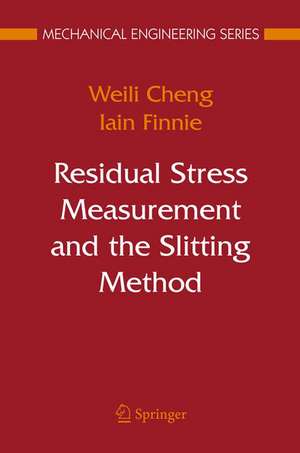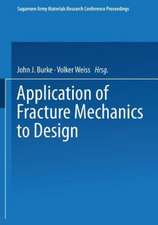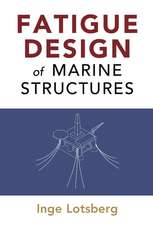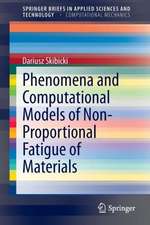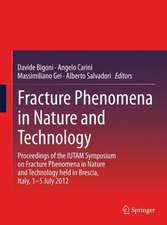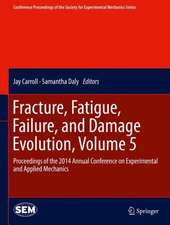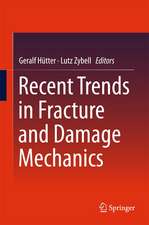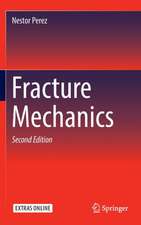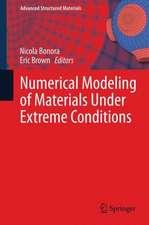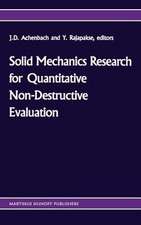Residual Stress Measurement and the Slitting Method: Mechanical Engineering Series
Autor Weili Cheng, Iain Finnieen Limba Engleză Hardback – 4 dec 2006
With more than 130 figures, Residual Stress Measurement and the Slitting Method provides detailed formulations and examples of compliance functions, weighted least squares fit and convergence test in stress estimation, and computer programs to facilitate the implementation of the slitting method. This book is an invaluable reference for professionals and researchers in the field.
| Toate formatele și edițiile | Preț | Express |
|---|---|---|
| Paperback (1) | 941.05 lei 6-8 săpt. | |
| Springer Us – 29 noi 2010 | 941.05 lei 6-8 săpt. | |
| Hardback (1) | 947.18 lei 6-8 săpt. | |
| Springer Us – 4 dec 2006 | 947.18 lei 6-8 săpt. |
Din seria Mechanical Engineering Series
-
 Preț: 391.84 lei
Preț: 391.84 lei - 18%
 Preț: 1110.72 lei
Preț: 1110.72 lei - 15%
 Preț: 593.73 lei
Preț: 593.73 lei - 18%
 Preț: 944.99 lei
Preț: 944.99 lei - 15%
 Preț: 653.14 lei
Preț: 653.14 lei - 17%
 Preț: 363.13 lei
Preț: 363.13 lei - 18%
 Preț: 1239.05 lei
Preț: 1239.05 lei - 15%
 Preț: 640.06 lei
Preț: 640.06 lei - 18%
 Preț: 1129.65 lei
Preț: 1129.65 lei - 15%
 Preț: 522.24 lei
Preț: 522.24 lei - 15%
 Preț: 654.77 lei
Preț: 654.77 lei - 15%
 Preț: 643.34 lei
Preț: 643.34 lei - 15%
 Preț: 611.40 lei
Preț: 611.40 lei - 18%
 Preț: 765.96 lei
Preț: 765.96 lei - 20%
 Preț: 631.71 lei
Preț: 631.71 lei - 18%
 Preț: 1009.22 lei
Preț: 1009.22 lei -
 Preț: 418.34 lei
Preț: 418.34 lei - 15%
 Preț: 640.71 lei
Preț: 640.71 lei -
 Preț: 403.53 lei
Preț: 403.53 lei - 18%
 Preț: 813.97 lei
Preț: 813.97 lei - 18%
 Preț: 1386.48 lei
Preț: 1386.48 lei - 18%
 Preț: 951.47 lei
Preț: 951.47 lei - 18%
 Preț: 833.09 lei
Preț: 833.09 lei - 18%
 Preț: 936.60 lei
Preț: 936.60 lei - 15%
 Preț: 644.49 lei
Preț: 644.49 lei - 18%
 Preț: 941.05 lei
Preț: 941.05 lei - 18%
 Preț: 1386.17 lei
Preț: 1386.17 lei -
 Preț: 399.67 lei
Preț: 399.67 lei - 18%
 Preț: 1389.44 lei
Preț: 1389.44 lei - 18%
 Preț: 790.46 lei
Preț: 790.46 lei - 18%
 Preț: 1388.22 lei
Preț: 1388.22 lei - 18%
 Preț: 1024.53 lei
Preț: 1024.53 lei - 15%
 Preț: 590.16 lei
Preț: 590.16 lei - 18%
 Preț: 1234.00 lei
Preț: 1234.00 lei - 18%
 Preț: 1386.62 lei
Preț: 1386.62 lei - 15%
 Preț: 543.85 lei
Preț: 543.85 lei -
 Preț: 391.61 lei
Preț: 391.61 lei - 18%
 Preț: 944.19 lei
Preț: 944.19 lei - 18%
 Preț: 736.16 lei
Preț: 736.16 lei - 18%
 Preț: 943.88 lei
Preț: 943.88 lei - 15%
 Preț: 693.21 lei
Preț: 693.21 lei - 18%
 Preț: 781.77 lei
Preț: 781.77 lei - 15%
 Preț: 639.08 lei
Preț: 639.08 lei - 23%
 Preț: 737.29 lei
Preț: 737.29 lei - 15%
 Preț: 641.53 lei
Preț: 641.53 lei -
 Preț: 401.42 lei
Preț: 401.42 lei
Preț: 947.18 lei
Preț vechi: 1155.11 lei
-18% Nou
Puncte Express: 1421
Preț estimativ în valută:
181.27€ • 188.55$ • 149.65£
181.27€ • 188.55$ • 149.65£
Carte tipărită la comandă
Livrare economică 14-28 aprilie
Preluare comenzi: 021 569.72.76
Specificații
ISBN-13: 9780387370651
ISBN-10: 038737065X
Pagini: 209
Ilustrații: XIV, 212 p.
Dimensiuni: 155 x 235 x 17 mm
Greutate: 0.49 kg
Ediția:2007
Editura: Springer Us
Colecția Springer
Seria Mechanical Engineering Series
Locul publicării:New York, NY, United States
ISBN-10: 038737065X
Pagini: 209
Ilustrații: XIV, 212 p.
Dimensiuni: 155 x 235 x 17 mm
Greutate: 0.49 kg
Ediția:2007
Editura: Springer Us
Colecția Springer
Seria Mechanical Engineering Series
Locul publicării:New York, NY, United States
Public țintă
ResearchCuprins
to Residual Stresses.- Elements of Measurement Using the Slitting Method.- Compliance Functions for Near-Surface Measurement: The Body Force Approach.- Compliance Functions for Through-Thickness Measurement: The LEFM Approach.- Compliance Functions for Through-Thickness Measurement: The FEM Approach.- Estimation of Residual Stresses.- Measurement of Through-Thickness Residual Stress.- Measurement of Axisymmetric Residual Stresses.- Estimation Using Initial Strains.- Residual Stresses and Fracture Mechanics.
Textul de pe ultima copertă
Residual Stress Measurement and the Slitting Method provides complete coverage of the slitting method with new results in analysis, computation and estimation. It discusses different roles of residual stresses from the fracture mechanics perspective. Covering both near-surface and through-thickness residual stress measurements, the book serves as a reference tool for graduate students, researchers and practicing engineers. The authors include discussions on the general expressions for residual stresses acting on the site of a slit, the analysis based on fracture mechanics solutions and finite element computations, the estimations using continuous and piecewise functions with and without least squares fit, examples of residual stress measurement and error analysis, the measurement of stress intensity factors, and many more timely topics.
With more than 130 figures, Residual Stress Measurement and the Slitting Method provides detailed formulations and examples of compliance functions, weighted least squares fit and convergence test in stress estimation, and computer programs to facilitate the implementation of the slitting method. This book is an invaluable reference for professionals and researchers in the field.
With more than 130 figures, Residual Stress Measurement and the Slitting Method provides detailed formulations and examples of compliance functions, weighted least squares fit and convergence test in stress estimation, and computer programs to facilitate the implementation of the slitting method. This book is an invaluable reference for professionals and researchers in the field.
Caracteristici
Provides complete coverage of slitting method with new results in analysis, computation and estimation Details the application of the fracture mechanics to residual stress measurements and the relation between the two in order to solve problems Includes formulations and computer programs to facilitate the implementation of the slitting method Covers both near-surface and through-thickness residual stress measurements Discusses on the general expressions for residual stresses acting on the site of a slit as well as the analysis based on fracture mechanics solutions and finite element omputations Includes supplementary material: sn.pub/extras
